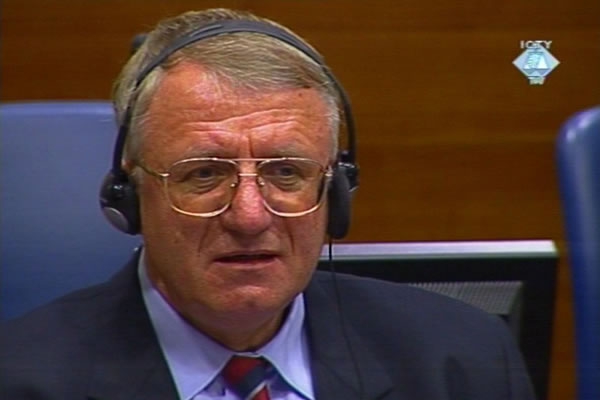Home
UNAPPRECIATED PEACEMAKER
The hate speeches that instigated the commission of crimes, as the prosecution alleges were in fact Seselj’s ‘warnings’ or even ‘peace-making efforts, expressed in stronger terms’, says the Serbian Radical Party leader. He used those words in an effort to prevent attacks on Serbs in Croatia and BH. Seselj feels sorry for not being able to end like his ‘friend Saddam Hussein’.
 Vojislav Seselj in the courtroom
Vojislav Seselj in the courtroom In his four-hour opening statement today, Seselj said he was ‘known for not talking rubbish’. Seselj is on trial for crimes in Croatia, BH and Vojvodina. He began with a ‘brief course’ of international and criminal law, history, linguistics, religion and other areas where he is an expert, in his own opinion. The three judges, Antonetti, Lattanzi and Harhoff, were thus able to get a taste of the rhetoric skill and fervor of the Serbian Radical Party leader. The indictment against him alleges that he personally committed crimes by hate speech, and by inciting his followers to criminal conduct.
Like Milosevic before him, Seselj doesn’t recognize the Tribunal. He sees it as ‘an illegal and illegitimate court of an extreme anti-Serb orientation’. Seselj challenges the concept of joint criminal enterprise and describes hate speech as ‘an invented crime. While he was on this topic in his opening statement, Seselj denied the Srebrenica genocide: as far as he knew, he said, about a thousand prisoners of war had been shot. This ‘is indeed a terrible crime, but it is not genocide’.
Criticizing the prosecution for ‘not understanding the concept of the Greater Serbia’ with its famous western border running along the Karlobag-Ogulin-Karlovac-Virovitica line, Seselj explained that it didn’t envisage the expulsion of the non-Serb population from these territories, but rather ‘raising their national awareness’ whereby they would realize that they were all Serbs in order to establish ‘brotherly concord and unity of Orthodox Serbs, Catholic Serbs, Muslim Serbs, Protestant Serbs and atheist Serbs’ who, he added, ‘all speak Serbian’.
The speeches which the prosecution sees as instigation to crimes were, according to Seselj’s explanation today, his ‘warnings’ and even ‘peace-making efforts expressed in stronger terms’. His intention was to prevent the attacks on Serbs in Croatia and BH. The infamous ‘rusty spoons’ he threaten the Croats with were just a ‘humorous warning’ or ‘black humor’.
Seselj didn’t deny that the Serbian Radical Party (SRP) brought together, equipped and trained volunteers and then sent them to the front lines in Croatia and BH. He said instead that they were part of the JNA chain of command and that none of them committed any of the crimes alleged in the indictment. Seselj contended that his volunteers were withdrawn from Vukovar before the Ovcara massacre. He laid the blame for the massacre on Aleksandar Vasiljevic, former chief of military security, who surrendered the Croatian prisoners to the local Territorial Defense troops. According to Seselj, there were no crimes in Vocin, Bijeljina, Brcko, Bosanski Samac, Zvornik, the wider Sarajevo area, Mostar and Nevesinje. If there were, they were committed by ‘Arkan’s troops’, ‘Mauzer soldiers’, Vuk Draskovic’s ‘Serbian Guard’ or ‘local Chetniks’ with whom he and Serbian Radical Party had no affiliation.
At the end of his opening statement Seselj expressed his regret that the Tribunal couldn’t sentence him to death. Such a sentence would enable him to ‘seal with death, like his friend Saddam Husein,’ the ideology of Serbian nationalism and immortalize it. As there is no capital punishment, Seselj called the Tribunal to deliver severest sentence available because it would, he believes, make his ideology stronger.
After the opening statement of the accused, the trial was adjourned until 11 December 2007 when the prosecution is due to call its first witness.
Linked Reports
- Case : Seselj
- 2007-11-07 PROSECUTION: SESELJ’S CRIME SPEECH
- 2007-11-06 101 PROSECUTION WITNESSES TO TESTIFY AGAINST VOJISLAV SESELJ
- 2007-11-06 GENERAL LAZAREVIC FIRST TO TESTIFY IN HIS OWN DEFENSE
- 2007-12-11 SESELJ 'ADVOCATED AND JUSTIFIED VIOLENCE'
- 2007-12-12 COULD SESELJ BE PROSECUTED FOR HIS ’THREATENING DISCOURSE’ IN THE USA?
- 2007-12-13 ‘CONFUSED AND PUZZLED’ SESELJ GETS A LESSON
